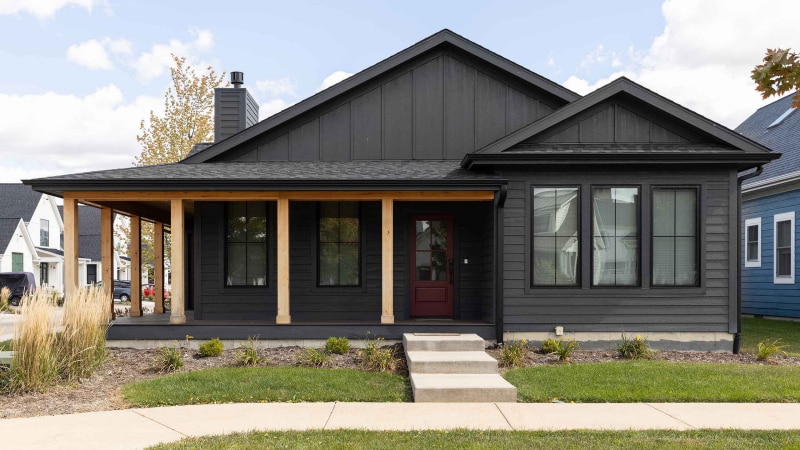Property survey: Definition, cost, and how to get one

When you're in the process of buying a home, there are several steps that need to be taken to ensure everything is in order. One of these steps may be a property survey, which is typically used to help confirm the property's official boundaries. Let's learn a little more about what a property survey is, the different kinds of surveys out there and the basics of how they work in case you need to get one.
What is a property survey?
Let’s start by defining what exactly a property survey is — an official record and evaluation of a property’s legally recognized boundaries and features. Generally speaking, a property survey helps measure and establish the boundaries of a given piece of land, identify any issues or discrepancies from previous records and determine whether you can undertake certain construction projects on that land. The survey may come in the form of a map showing the property and its boundaries, along with a written document providing the surveyor’s findings and recommendations.
For example, you might decide to get a property survey if you’re planning to build a new structure on your land, such as a pool or accessory dwelling units (ADUs). Placing a fence is another common reason for property surveying since for this project you need to know precisely where the boundaries of your property end. On top of this, as a potential homebuyer, you may want to see the results of a property survey to ensure your prospective new home satisfies all codes and requirements.
Types of property surveys
Property surveys can be done for many different purposes, and there are a variety of survey types to consider depending on your needs. Here are some of the most common types of property surveys you might encounter:
- Mortgage survey: A mortgage survey may be required by certain lenders before approving the loan to confirm the prospective property corresponds with the legal documents.
- Boundary survey: People use boundary surveys to determine the exact locations of a property’s boundary lines and corners. For example, this might be especially handy if you’re facing an encroachment issues issue with your neighbors.
- Topographic survey: This type of property survey is used to show any natural or man-made property features, their size, height and exact location. For example, they may include buildings, trees, ponds and changes in elevation. Experts may use this type of survey to determine whether a specific part of your land is suitable for a construction project and use it as assistance with planning and design process.
How much does a property survey cost?
The cost of a property survey depends on the type of survey conducted, the scope of the assessment, its physical location, the time of the year and who you decide to hire, among other variables. An important factor is the size of the property since some property surveyors may charge per square foot or per acre. Generally, boundary and mortgage surveys tend to be less expensive. A topographic property survey may cost significantly more, as it could require more equipment and overall work.
It’s worth remembering that every situation is unique, so you may find it helpful to contact a local surveyor for an estimate that’s more tailored to your circumstances. Also, you might want to shop around for several quotes to help you make a more educated choice.
Where can I find a property survey?
Let’s consider a hypothetical scenario where you’ve recently bought a house and want to take a look at your property survey. In certain cases, it may be possible to find a previous survey of the same property without hiring a professional to conduct a new one.
First, you may want to try checking the property deed, as some deeds might feature additional information about the property (including its precise dimensions) in the form of a boundary survey. You might also try your luck at the local courthouse, land recorder’s or tax accessor’s office since previous owners might have submitted a property survey to those institutions. Finally, many states and counties often require the preservation of these records in one of the department’s archives. These places include Planning and Zoning Divisions, engineering departments and similar units.
How to get a survey of my property
If you can't find an existing property survey for your property, it’s time to turn to professionals who offer property surveying services. If you’re a DIY kind of person and decide to undertake a large construction project or even sell the house yourself, keep in mind that only a licensed professional can issue an official, legally recognized property survey.
To find the right person for the job, you could start by contacting your neighbors or local real estate agents working in the area to see if they have leads on a trustworthy property surveyor. It may also be possible to reach out to the person who surveyed your property previously (if the property was previously surveyed). Going back to the previous surveyor may be quicker and more cost-effective, as they might still have records and maps they used previously in their files. Finally, you could try looking for a professional property surveyor online. If you go this route, it’s helpful to read reviews and stick to the property surveyors who are local, since they must be licensed to work in your state.
What does a property survey include?
As you learned earlier, property surveys may serve different purposes. Depending on the survey type, you may receive varying insights. Here are some examples of information you may find in a property survey:
- Exact dimensions and boundaries of the property
- Utility lines
- Property elevation changes
- Hazard areas
- Flood-prone zones
In summary
As a potential homebuyer or current homeowner, it’s likely you’ll encounter the term “property survey” at one point or another. Property surveys legally define the lines and boundaries of your property, which can help avoid neighborly disputes and potentially give you a deeper insight into your property.
Property surveys help buyers feel more confident about the specifics of the property they're considering. For homeowners, a property survey may be a useful way to gain insights on the land and assess the viability of any potential future upgrades and additions to it. If you're looking into a property survey for a mortgage, consider consulting with a home lending professional to learn more.
Property survey FAQs
1. Are property surveys public record?
Generally speaking, yes. State authorities often require homeowners to share the property survey with the local government, so you could likely find a property survey in one of their open-access databases. However, there are also some instances when only the property owner and the property surveyor may view the survey results.
2. How can I find a survey of my property online?
In some cases, you may be able to find your property’s survey online instead of having to run around town trying to locate a physical copy. Some local offices keep their records digitized, and you may be able to access them and find your property if you have enough information about it. Sometimes, you can also request the office to mail you a copy of the property survey.
3. How long does a property survey take?
Property surveying is a complicated undertaking that consists of multiple steps and requires a licensed professional to do it correctly. For this reason, you could reasonably expect the entire process to take up to a couple of weeks. It might be a good idea to establish a timeframe with the contractor before the start of the project.
4. Do you need a property survey to buy or sell a house?
As with many other subjects in real estate, the answer is “it depends.” Some lenders require a property survey if you plan to purchase a home with a mortgage. Otherwise, you might be able to buy a home without one. However, just like with home inspections, you may still want to consider getting a property survey anyway to ensure the documents describe the property correctly. The same applies to those planning to sell their house.



